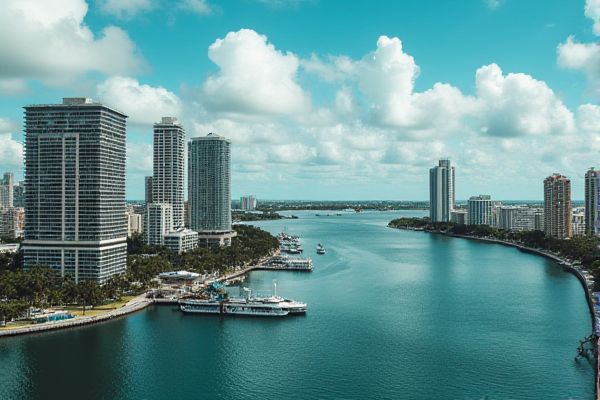
Insights from Florida residents and expatriate communities: Diverse culture and demographics. Vibrant culinary scene. Strong expat support networks. Varied climate conditions by region. Cost of living variations. Active outdoor lifestyle options. Educational opportunities available. Robust healthcare facilities. Tax benefits for residents. Transportation and commuting options.
Diverse culture and demographics.
Florida is characterized by a highly diverse culture and demographics, with a population that includes a majority of European Americans, a significant Hispanic or Latino population, and substantial African American and Asian communities. The state is home to large immigrant groups from Latin America, the Caribbean, and other regions, making it one of the most culturally diverse areas in the United States. To explore this further, visit Demographics of Florida on Wikipedia for a comprehensive overview.
Vibrant culinary scene.
Florida's culinary scene is thriving, with numerous MICHELIN-recommended restaurants, including new additions in Miami, Orlando, and Tampa that reflect the state's diverse cultural and culinary landscape. The array of dining options in Florida showcases a mix of flavors from Latin and Asian fusion to fresh seafood and farm-to-table cuisine. To explore more about this vibrant culinary scene, visit the Culinary Scene Heats Up page which offers insightful details and highlights of this gastronomic evolution.
Strong expat support networks.
Strong expat support networks in Miami are facilitated through InterNations, which offers a close-knit community where expats can connect through monthly events, share hobbies, and receive advice and support from experienced members, helping to ease the transition to a new life.
Varied climate conditions by region.
Florida residents and expatriate communities experience varied climate conditions, with South Florida having a tropical climate characterized by warm temperatures and high humidity. In contrast, [Central and Northern Florida](https://ecmservice.com/understanding-temperature-differences-across-florida/) have a humid subtropical climate with hot, humid summers and cooler, sometimes cold winters.
Cost of living variations.
The cost of living in Florida varies significantly across different cities, with some areas like Miami and Fort Lauderdale being 17-20% higher than the national average, while others like Pensacola and Palm Coast are 13% lower. Overall, Florida's cost of living is 2% lower than the national average, with lower costs in healthcare, food, and goods & services, but housing costs are on par with the national average. For more detailed insights, you can explore the Cost of Living Calculator to understand how these differences might affect your choices.
Active outdoor lifestyle options.
Florida residents and expatriate communities can enjoy a diverse range of outdoor activities, including standup paddleboarding in the Thousand Islands Conservation Area, kayaking on the Wekiva River, snorkeling at Blue Heron Bridge, and exploring the unique ecosystems of Hontoon Island and Anastasia State Park. According to a comprehensive Florida Outdoor Guide, the state offers a wide variety of outdoor lifestyle options. From hiking and kayaking in wilderness areas to visiting unique spots like Butterfly World, Bok Tower Gardens, and the Vortex Spring, Florida caters to various interests and provides opportunities to interact with the state's diverse wildlife and natural landscapes.
Educational opportunities available.
Florida residents, particularly students at New College of Florida, have access to a variety of educational opportunities including domestic exchange programs through the National Student Exchange and international study abroad programs, allowing for cross-cultural engagement and academic enrichment both within the U.S. and globally. Expatriate communities in Miami can choose from a range of educational options, including over 400 private schools and several international schools offering the International Baccalaureate program, which provides globally recognized and transferable education, catering to the needs of expat families with varying lengths of stay. For more information on these opportunities, visit the New College of Florida website.
Robust healthcare facilities.
Florida boasts a robust network of healthcare facilities, including hospitals, pharmacies, and urgent care centers, ensuring comprehensive and accessible care across the state. The high foot traffic in these pharmacies and urgent care centers indicates prompt responses to immediate health needs. For more detailed insights, visit the comprehensive guide on Florida Health Care Establishments Data in 2024 to explore everything you need to know about the healthcare landscape in the region.
Tax benefits for residents.
Florida residents enjoy significant financial advantages due to the absence of a state income tax, which is one of the key reasons many individuals choose to relocate there. Furthermore, the state offers a beneficial Homestead Exemption that can decrease the taxable value of a property by up to $50,000, providing substantial savings for homeowners. Additionally, retirees can enjoy peace of mind knowing that there are no taxes imposed on Social Security benefits, pensions, IRAs, or 401(k) distributions. For more detailed information on these benefits, you can visit the Polaris Tax and Accounting website.
Transportation and commuting options.
Florida residents and expatriate communities have access to a variety of transportation and commuting options, including affordable bus services like Greyhound and Megabus, trolley services in major cities like Miami and Orlando, and train options such as Amtrak and Brightline. Additionally, many areas offer free or low-cost shuttle services, such as the I-RIDE Trolley in Orlando and the Citywide Trolley in Miami, making it convenient to move around without a car. For more detailed information on getting around, check out the comprehensive International Travel Tips page on Visit Florida's website.
